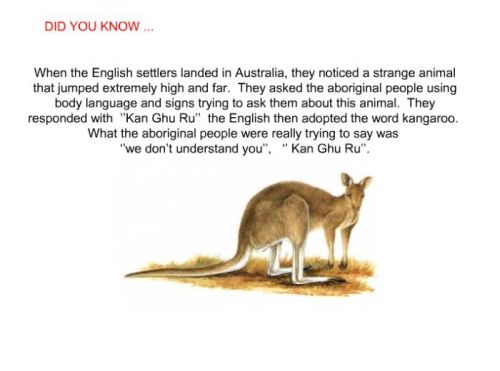
(
Blackadder) According to
Wikipedia,
In 1820 Phillip King visited the area and could not confirm Cook’s record; some then suggested that Cook and Banks had erred. This is apparently the basis for the long-standing myth that Cook is supposed to have asked a native “What is that?” to which the reply “kangaroo”, supposedly meaning “I don’t know”, was given. Though amusing, this is not the case. John Haviland studied Guugu Yimidhirr extensively in 1972, confirming gangurru and concluding King had been told minha.
And according to
Online Etymology Dictionary,
1770, used by Capt. Cook and botanist Joseph Banks, supposedly an aborigine word from northeast Queensland, Australia, usually said to be unknown now in any native language. However, according to Australian linguist R.M.W. Dixon ("The Languages of Australia," Cambridge, 1980), the word probably is from Guugu Yimidhirr (Endeavour River-area Aborigine language) /gaNurru/ "large black kangaroo."
Finally,
The Word Detective agrees, and points out that this myth didn't originate with Ripley's Believe It or Not, but it was that syndication that made it part of the broader public "knowledge."
The kernel of truth underlying the story is that Captain James Cook, the first European explorer to reach Australia in 1770, did indeed bring back news of a creature the Australian native peoples called a "kangooroo" or "ganguru." Unfortunately, linguists cataloging the various Aboriginal languages many years later were unable to find anything like "kangaroo" in any existing native tongue. But the logical presumption is that the dialect Cook heard had simply become extinct over the intervening years. There is no evidence that "kangaroo" ever meant "I don't know," "What are you talking about," or any of the other responses supposedly given to his query.
Still, it's an amusing and potentially believable story. It's fun to think that there might be any number of critters whose common names are based on natives glancing worriedly at each other and saying, in essence, "WTF?" I'm thinking opossum, platypus, capybara, and others, but I'm not going to look those up.
 (Blackadder) According to Wikipedia,
(Blackadder) According to Wikipedia,









No comments:
Post a Comment